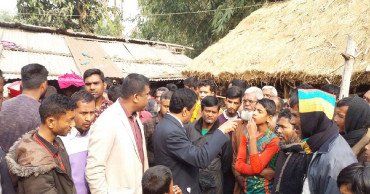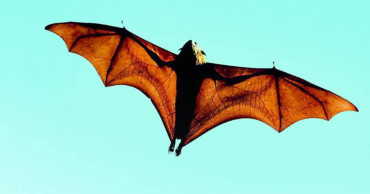Nipah Virus
Bangladesh reports first Nipah virus death this year
Bangladesh has confirmed its first Nipah virus (NiV) death in 2026, with officials reporting that a woman succumbed to the brain-damaging illness after consuming raw date juice.
The case was reported in the northern Naogaon district, Sharmin Sultana, senior scientific officer at the Institute of Epidemiology, Disease Control and Research, said Saturday.
The patient in her 40s developed symptoms consistent with NiV infection on Jan. 21, including fever, headache, muscle cramps, loss of appetite (anorexia), weakness, and vomiting, followed by hypersalivation, disorientation, and convulsion, according to the World Health Organization.
On Jan. 27, the woman became unconscious and was referred by a local physician to a tertiary hospital.
Bangladesh reported its first case of NiV infection in 2001.
Since then, human infections have been reported almost every year. In 2025, four laboratory-confirmed fatal cases were reported in Bangladesh.
19 days ago
Reovirus detected in Bangladesh: 5 cases identified
For the first time in Bangladesh, the Institute of Epidemiology, Disease Control, and Research (IEDCR) has detected the Reovirus in the bodies of five individuals.
This discovery came after testing patients with Nipah virus symptoms in 2024, IEDCR Director Professor Tahmina Shirin told UNB on Friday.
Fortunately, none of the affected individuals became seriously ill. After receiving treatment, all of them recovered and returned home, she said.
The health department has assured that there is no cause for concern regarding the Reovirus.
Read: HMPV Virus Outbreak: Causes, Symptoms, Treatment and Prevention
It is common for many individuals to be infected with the Nipah virus after drinking raw date juice during the winter months. However, the five individuals who tested positive for the Reovirus were all negative for the Nipah virus.
This disease has not spread widely, and these five cases are the first instances of Reovirus in Bangladesh.
Read more: Rise of Human Metapneumovirus sparks concerns
The virus was identified through regular research conducted by IEDCR in collaboration with Columbia University, USA.
1 year ago
Two baby sisters succumb to mysterious virus after ‘eating unwashed plums’
In a heart-wrenching incident in Rajshahi, two baby sisters passed away within four days of each other after contracting an unidentified virus, as reported by medical professionals.
The almost two-year-old younger sister, Muntaha Marisha, tragically died en route to the hospital last Wednesday, while her elder sister, four years and nine months old Muftaul Mashiya, passed away on Saturday afternoon during treatment at Rajshahi Medical College Hospital (RMCH). The girls were the daughters of Manjur Rahman, a mathematics teacher at Rajshahi Cadet College, residing with his family in the college's quarters in Sarda.
Physicians at RMCH initially suspected a viral infection but awaited confirmation pending laboratory results from samples sent to Dhaka for analysis. The girls' parents, Manjur and Poly Khatun, have been placed in RMCH's isolation ward.
Read: Nipah Virus: Don’t Consume This If You Want to Be Safe
Dr. Abu Hena Mostafa Kamal, an ICU physician at RMCH, mentioned that there is a suspicion of the Nipah virus, although the girls' parents refuted this possibility.
He noted that the children had consumed unwashed plums, which could potentially be linked to the Nipah virus or another viral agent. The definitive cause of death awaits the results of the samples sent for testing.
Poly Khatun recounted the events leading to their illness, stating that their domestic help had given the girls unwashed plums from a tree on campus on the morning of February 13. The following day, Marisha developed a fever, exhibited repeated vomiting, and showed signs of severe dehydration. Despite being rushed to the Rajshahi Combined Military Hospital (CMH), Marisha died en route. Mashiya exhibited similar symptoms the next morning and, after initial treatment at the Upazila Health Complex and CMH, was transferred to RMCH, where she was admitted to the ICU.
Read: Nipah virus: Two patients from Manikganj die in Dhaka
Both sisters displayed black spots on their bodies before their deaths, a symptom noted by their mother.
RMCH physician Mostafa Kamal clarified that there have been no reported deaths from the Nipah virus in Rajshahi this year. However, he confirmed that a viral infection caused the sisters' deaths, emphasizing the rapid progression of their illness and the limited opportunity for treatment. The parents remain in hospital isolation as precautions continue.
Read more: Ancient viruses can help fight cancer, scientists say
2 years ago
Nipah Virus: Don’t Consume This If You Want to Be Safe
Md. Babul Hossain, 38, a resident of Manikganj, succumbed to the Nipah virus recently. Just days prior, 27-year-old Lutfar Rahman from the same district died under similar circumstances. Although there was no official confirmation of Nipah virus in Lutfar's case, according to the Upazila Health and Family Planning Center, the situation has sparked panic.
Not only for Manikganj, but it is a matter of concern for Bangladesh, given the vulnerability to this virus in recent years. It is imperative to acquire accurate knowledge about Nipah virus infection and take appropriate action to prevent its spread. To prevent infection, let's understand how the Nipah virus spreads and identify its sources.
What is the Nipah Virus?
Nipah virus, in short NiV, is one of many types of zoonotic viruses. A zoonotic virus refers to a virus that can be transmitted between vertebrates and humans.
While the potential carriers of NiV are numerous, its presence has been observed primarily in pigs and bats. Specifically, the carrier of NiV is fruit bats of the genus Pteropus, commonly known as the flying foxes.
Pteropus is among the largest species of bats globally. They are commonly found in Southeast Asia, India, South Asia, Australia, East Africa, and the Pacific Islands.
Read more: After father-in-law, woman dies of ‘Nipah virus’ in Naogaon
How is the Nipah Virus Spread?
The essential genetic material in an animal's body is RNA or ribonucleic acid. NiV primarily infects the entire animal by targeting this RNA. Subsequently, when another animal comes into contact with the infected one, the viral RNA spreads to the healthy animal. The contact can be made through various mediums, such as
- Direct contact with infected animals, such as bat blood, saliva, vomit, or feces, poses a risk.
- Location of palm trees near yards, water wells, agricultural fields, or domestic animal shelters, can enhance the risks of contamination.
- Consumption of food or water contaminated with body fluids of NiV infected animals, such as palm sap and water from wells contaminated by bats, or partially eaten fruits by bats, can also facilitate the transmission of Nipah virus.
- Contact with an NiV infected person, involving exposure to blood, spit, sneezes, vomit, feces, or even respiratory droplets, is another route of Nipah virus transmission. Several incidents in Bangladesh and India proved that NiV is airborne and moderately contagious.
Read more: Suspected Nipah virus patient dies in Barishal
Most Vulnerable Communities to Nipah Virus Outbreaks
While human-to-human transmission was not initially reported, this phenomenon is being increasingly observed, especially in Bangladesh and neighboring countries like India.
Hospital workers caring for patients infected with Nipah virus, family members of patients, and individuals involved in palm juice harvesting are now at the highest risk.
2 years ago
Nipah virus: Two patients from Manikganj die in Dhaka
Two people from Manikganj, who were infected with Nipah virus after consuming raw date juice, died in Dhaka while undergoing treatment.
The deceased were Babul Miah, 38, son of former union parishad member Mainuddin, and Lutfor Rahman, 27, son of Nazimuddin, hailing from Putail union of Manikganj’s Sadar upazila.
District Civil Surgeon Dr Mohammad Moazzem Ali Khan Chowdhury confirmed that Babul died after being infected with Nipah virus while Putail Union Parishad Chairman Jasim Uddin confirmed Lutfor’s death.
Read: COVID-19: Bangladesh reports 28 more cases in 24hrs
It was learnt from the civil surgeon's office that Babul was admitted to Manikganj 250-bed General Hospital with fever and headache on January 16. A day later, a team from Dhaka’s International Centre for Diarrheal Disease Research, Bangladesh (icddr,b) came and did his medical checkup.
On January 18, he was shifted to a private hospital in Dhaka when his condition worsened and subsequently it was detected that he was infected with Nipah virus.
Babul breathed his last while undergoing treatment in the private hospital last Saturday, the civil surgeon’s office said.
Local UP Chairman Jasim said Lutfor had been suffering from fever, headache and other complications after drinking raw date juice.
Though initially he took medicine from a local pharmacy, later he was hospitalized in Dhaka when his condition deteriorated, he said, adding that Lutfor died while undergoing treatment there on January 16.
Civil Surgeon Dr Moazzem said they had information on Babul’s death from the Nipah virus but are not aware of Lufor’s cause of death.
Read: Dengue: Bangladesh reports zero death with 20 new cases in 24 hrs
According to icddr,b, consumption of raw date juice, contaminated with bat saliva or urine, causes Nipah virus.
2 years ago
After father-in-law, woman dies of ‘Nipah virus’ in Naogaon
A 25-year-old woman, who was admitted to Rajshahi Medical College and Hospital with symptoms of Nipah virus infection, died on Wednesday, 20 days after her father-in-law had died of the same virus.
The deceased was identified as Farida Begum, wife of Abdul Khalek of Chakoar village in Manda upazila of the district.
Besides, the mother-in-law of Farida has been undergoing treatment at the Intensive Care Unit (ICU) of the hospital with the same symptoms.
Dr Bijoy Kumar, Manda Upazila Health Officer, said Farida was admitted to Manda Upazila Health Complex on Sunday with fever and cold.
Later, the hospital authorities took samples suspecting that she was infected with Nipah virus and sent the sample to Dhaka for test.
Meanwhile, she was shifted to Rajshahi Medical College and Hospital where she breathed her last around 5 pm.
Local people said Abdul Khalek along with his family took raw date juice on February 4. On February 6, Khalek caught fever and cold. He was taken to Naogaon Sadar hospital the next day and later he died on way to Rajshahi Medical College and Hospital on February 8.
Dr. Bijoy Kumar Roy, said already a medical team has been sent to the area and process is on to take necessary steps.
A total of five people died of Nipah virus across the country this year, said Health Minister Zahid Maleque on January 29.
Healthy people who come in contact with the infected ones also have possibility of being infected with the virus and it spreads from person to person quickly which is a matter of concern, he added.
The government has taken steps to prevent the spread of Nipah virus, said the minister.
According to icddr,b in Bangladesh, Nipah virus is usually acquired through consumption of date palm sap contaminated with bat saliva or urine.
Also read; Suspected Nipah virus patient dies in Barishal
On January 29, Health Minister Zahid Maleque said a total of five people died of Nipah virus across the country this year.
Eight people were infected with the Nipah virus and of them five people died.
According to icddr,b in Bangladesh, Nipah virus is usually acquired through consumption of date palm sap contaminated with bat saliva or urine.
2 years ago
Nipah virus kills 5 this year: Health Minister
A total of five people died of Nipah virus across the country this year, said Health Minister Zahid Maleque on Sunday.
“Eight people were infected with Nipah virus and of them five people died,” he said at a press briefing over the Nipah virus outbreak at the Secretariat.
Usually more than 70 percent of infected people die and people who drink raw date juice and fruits partially eaten by birds, especially bats, have possibility of being infected with the virus, he said.
“Besides, healthy people who come in contact with the infected ones also have possibility of being infected with the virus and it spreads from person to person quickly which is a matter of concern,” he added.
The government has taken steps to prevent the spread of Nipah virus, said the minister.
“First of all we have to make people aware about the virus through media,” said Maleque.
Besides, the government has taken step to create dedicated ward and separate Intensive Care unit at hospitals for providing treatment to the infected people, he said.
Also read: Transfer of immunity against Nipah virus from mother to child: icddr,b
There is vaccine or medicine for treatment of Nipah virus infected patients, he added.
He also urge people to remain alert about the spread of the virus, refrain from drinking raw date juice and fruits eaten by birds or animals.
Replying to a question about the current situation of the virus, the minister said “We are trying our best to contain the spread of the virus.”
3 years ago
IEDCR team visits spot after 2 die of ‘unknown disease’ in Thakurgaon
A team of Institute of Epidemiology Disease Control and Research (IEDCR) on Tuesday morning visited Songaon village in Baliadangi upazila where two members of a family died of ‘unidentified disease’ and three others fell sick.
6 years ago
Bangladesh confirms Nipah case in Khulna
A young girl was diagnosed with Nipah virus at Khulna Medical College Hospital (KMCH) on Thursday – the first reported case at the hospital in three years.
6 years ago

















